I spoke this morning with Tom McCarthy, director-writer of The Visitor (Overture, 4.11 limited). He was calling from a train from Boston to New York. The reception cut out at one point, but is otherwise audible. The chat runs about 25 minutes.
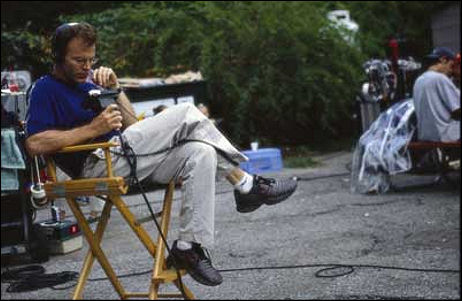
I spoke this morning with Tom McCarthy, director-writer of The Visitor (Overture, 4.11 limited). He was calling from a train from Boston to New York. The reception cut out at one point, but is otherwise audible. The chat runs about 25 minutes.

Tom McCarthy‘s The Visitor (Overture, 4.11 limited) is easily among the best films of the year so far — right up there with The Bank Job, Young @Heart, Shine a Light, In Bruges, Taxi to the Dark Side and 4 Months, 3 Weeks & 2 Days. If I’d been more on my game I would have seen it at last January’s Sundance Film Festival, but something obstructed. (I’m telling myself it was the 72-hour flu that got me the night before Heath Ledger was found dead.)
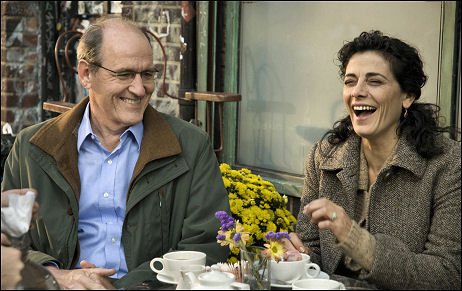
Set mostly in Manhattan, The Visitor is about a dull middle-aged academic (Richard Jenkins) discovering a pair of illegal immigrants (Haaz Sleiman, Danai Gurira) living in his barely-visited New York City apartment (due to a subletting by a con artist), and how he gradually comes to care for them and help out when Sleiman’s character, a Syrian, gets into trouble with the INS.
It’s also about the dull bird, who is called Walter Vale, gradually falling for Sleiman’s beautiful dark-haired mom (Hiam Abbass) when she visits New York to try and help with her son’s situation. The last third of the story is about coping with the threat of a deportation while love gently blooms — a mixture of Kafka and alpha.
Shot on a shoestring, The Visitor is a modest but fully realized middle-aged love story that’s about a lot more than just a man and a woman finding each other. It’s about heart and music and beating a native drum. It’s also about post-9/11 bureaucratic paranoia, and about the shedding of crusty skin. It’s exceptional in the way that it unfolds with elegance and simplicity from start to finish. It touches precisely because it doesn’t seem to try all that hard. McCarthy just ladles it out, pouring by pouring.
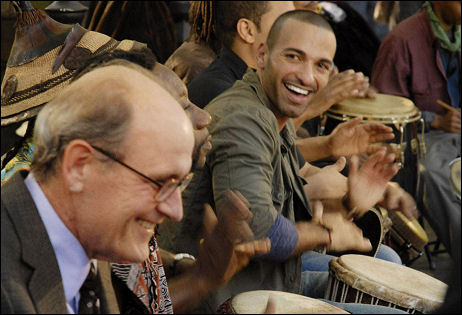
And it has two award-quality performances from Jenkins and Abbass that will almost certainly be remembered at year’s end. Jenkins’ name may not ring a bell, but you definitely know his bald head, lean face and sadly creased eyes. He plays it way down at first — curt, glum , inexpressive — but gradually the pores open. His emotionally muffled college professor experiences one of those spiritual growth spurts that small movies specialize in — ones that enploy just the right amounts of skill and suppressed feeling. Jenkins has achieved the same kind of thing that Peter Reigert managed in Local Hero; ditto Marianne Sagebrecht in Baghdad Cafe.
The Israeli-born Abbass is almost as much of a revelation. She radiates warmth, hurt, sadness, maturity, sensuality.
Almost every critic has fallen for The Visitor, which, of course, means nothing in terms of your average moviegoer wanting to see it or not. The situation is further complicated by the fact that McCarthy’s decision to give the lead role to Jenkins, a character actor whose best role before this was the gay FBI agent in Flirting with Disaster, is both an inspiration and a problem.
You know that the Average Joe is going to go “Richard who?” Jenkins has achieved a career triumph here, but Jack Nicholson in Terms of Endearment he’s not. The Visitor isn’t that kind of movie, and Walter Vale isn’t that kind of role. How interested are you in seeing a love story starring the balding clerk from your local DMV or the manager of the supermarket just down the street? When it comes to stories about older folks scratching that itch, moviegoers tend to respond more easily to middle-aged actors with rascally vigor and charm. And yet what happens in The Visitor really and truly kicks in. You’ve got to see it to believe it.

Overture is facing an uphill marketing struggle, but The Visitor has the kind of heart and craft that mature moviegoers are always looking for. Here’s hoping that the ding-dongs who refuse to read reviews or consider the recommendations of online columnists like myself will at least listen to their friends who will hopefully see The Visitor and tell them to get off their backsides and go. Unless, of course, their friends are just as determined to avoid reading about movies as they are.
This is McCarthy’s sophomore effort following ’03’s The Station Agent, which he also wrote as well as directed. He’s a fine actor also. He played the journalist Scott Templeton in The Wire and the dutiful Bradley son in Flags of Our Fathers. Besides his promotional chores on The Visitor, he’s currently filming Tony Gilroy‘s Duplicity.
Near the end of Errol Morris‘s Standard Operating Procedure (Sony Classics, 4.25 NYC, 5.2 LA), which examines the whys and the particulars of the Abu Ghraib prisoner-torture scandal, a middle-aged, non-military investigator who looked into the matter while stationed in Iraq (and apparently remained there for a prolonged period), offers a conclusion about the overall Iraq War effort that is blunt, bitter and shorn of any semblance of spin. It last 43 seconds.

Listen to it right here. He mentions the Abu Ghraib scandal first, but he quickly shifts into an appraisal of the U.S. military mission in Iraq. I’ve never heard a veteran of that inferno sum things up quite so succinctly: “There’s not a snowball’s chance in hell you can fix any of that,” he says. “If we leave, they’re killing each other and they’re not killing us. If we stay, they’re killing each other and they’re killing us. That’s the end result of this whole fuckin’ debacle.”
I’d like to see this guy talk to John McCain and listen to McCain tell him, “No, the surge is working…this is the central essential conflict of our times….we have to stay and see this through,” etc. I’d like to hear what this guy says back to McCain. I’d like to see the expression on his face as he does this.
“Bad buzz. Creative infighting. Superhero gridlock at the multiplex. For Marvel Studios, handling gamma rays is starting to look like a cakewalk compared to turning The Incredible Hulk (Universal, 6.13) into a movie franchise.” — the lead graph from Brooks Barnes‘ 4.10 N.Y. Times piece, which mainly focuses on negative fan reaction to the trailer and creative differences between star-screenwriter Ed Norton and Marvel Studios chairman David Maisel.
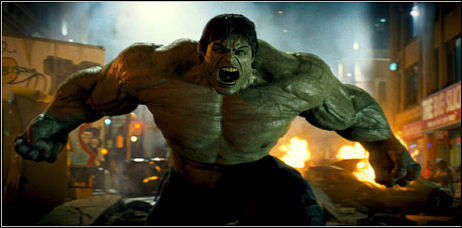
What’s the point of running a tribute to the original 1965 George Lois Esquire cover with Virna Lisi? It meant something in the mid ’60s, sort of — obviously a faint provocation or taunt aimed at forward-thinking women — but what does it mean for Jessica Simpson to repeat it for the May issue? Nothing. The Esquire website, which is always behind the curve, doesn’t even mention it.
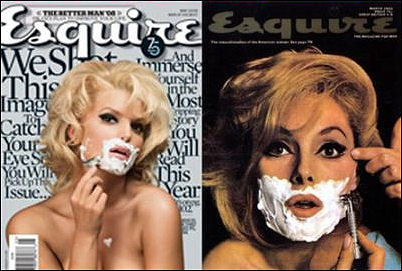
A $30 million Ben-Hur mini-series has been launched by Alchemy TV, producer David Wyler (son of Willam Wyler, the director of the 1959 Oscar-winning classic) and director Christian Duguay. Fine…except for two problems.
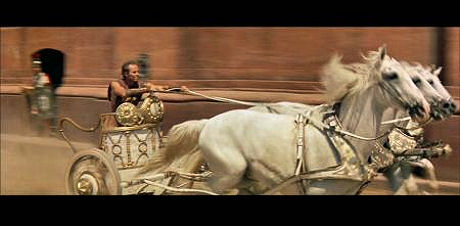
Problem #1 is that the present-tense Wyler told Variety‘s Ali Jaafar and John Hopewell that “in my mind” the miniseries “is dedicated to my dad and [Charlton Heston]…we think it’s a great way to keep his memory alive.” Never, ever make a movie as a tribute to anyone or anything. Make it only for reasons that are tied to the present and future tense. Make it for your own reasons, because you have a vision or at least a concept that you’re burning to put onto a big screen.
Problem #2 — and certainly a major challenge — will be the chariot race sequence. The only way the miniseries version will stand up to the ’59 version will be if they shoot it entirely “live” and CG-free. And what are the odds of that happening, given the realities of present-day production?
I love that Wyler and Duguay intend to “downplay the religious aspects of the source material.” Well, naturally. The original Lew Wallace novel was subtitlled “A Tale of the Christ” but that kind of thing would only play in the Christian marketplace today. Besides, Ben-Hur always and always will be a story about revenge. What kind of dramatic satisfaction would the ’59 or ’26 versions have delivered if the evil Messala hadn’t been beaten and died from injuries in the chariot race?
“There is a strangely static and claustrophobic quality to the fiercely loyal cult Hillary Clinton has gathered around her since her first lady years,” writes Salon‘s Camille Paglia in a deliciously phrased diss piece [dated 4.9.08].

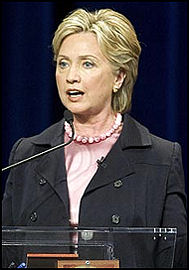
“Postmortem analysts of this presidential campaign will have a field day ferreting out all the cringe-making blunders made by her clique of tired, aging courtiers who couldn’t adjust to changing political realities. Hillary’s forces have acted like the heavy, pompous galleons of the imperial Spanish Armada, outmaneuvered by the quick, bold, entrepreneurial ships of the English fleet.
“The male staff who Hillary attracts are slick, geeky weasels or rancid, asexual cream puffs. (One of the latter, the insufferable Mark Penn, just got the heave-ho after he played Hillary for a patsy with the Colombian government.) If I were to hazard a guess, I’d say Hillary is reconstituting the toxic hierarchy of her childhood household, with her on top instead of her drill-sergeant father. All those seething beta males are versions of her sad-sack brothers, who got the short end of the Rodham DNA stick.
“The compulsive war-room mentality of both Clintons is neurosis writ large. The White House should not be a banging, rocking washer perpetually stuck on spin cycle. Many Democrats, including myself, have come to doubt whether Hillary has any core values or even a stable sense of identity. With her outlandish fibbing and naive self-puffery, her erratic day-to-day changes of tone and message, her glassy, fixed smiles, and her leaden and embarrassingly unpresidential jokes about pop culture, she has started to seem like one of those manic, seductively vampiric patients in trashy old Hollywood hospital flicks like The Snake Pit. How anyone could confuse Hillary’s sourly cynical, male-bashing megalomania with authentic feminism is beyond me.
“Obama’s Rezko embroglio is certainly troublesome. But the splotches on Obama’s record are few and relatively minor compared to the staggeringly copious chronicle of Clinton scandals, a mud mountain that the media have shown amazingly little interest in exploring during this campaign cycle. For all their grousing about media bias, the Clintons have gotten off scot-free over the past year from any kind of serious, systematic examination of their sleaze-a-thon history from Little Rock to Foggy Bottom.
“Obama has actually served longer in public office than Hillary has. It’s very true that he lacks executive experience, but so does she. Her bungling of healthcare reform, along with her inability to control the financial expenditures and internal wrangling of her campaign, does not bode well for a prospective chief executive.
“Beyond that, I’m not sure that your analogy to professionals like doctors, accountants and teachers entirely applies to presidents. There is no fixed system of credentialing for our highest office. On the contrary, the Founders envisioned the president as a person of unpretentious common sense and good character. Hillary may spout a populist line, but with her arrogant sense of dynastic entitlement, she’s a royalist who, like Napoleon, wants to crown herself.
“I too wish that Obama had more practical experience in government. But Washington is at a stalemate and needs fresh eyes and a new start. Furthermore, at this point in American history, with an ill-conceived, wasteful war dragging on in Iraq and with the nation’s world reputation in tatters, I believe that, because of his international heritage and upbringing, Obama is the right person at the right time. We need a thoughtful leader who can combine realism with conciliation in domestic as well as foreign affairs.”
The formidable Tommy Lee Jones lets go with three choice comments during an interview with 02138‘s Richard Bradley — about Iraq and the draft, righties pushing for the building a border fence between the U.S. and Mexico, and the meaning of the ending of No Country for Old Men.

(1) Draft/Iraq: “About eight months ago, [New York Democratic congressman] Charlie Rangel came out advocating the reinstitution of the draft, and people were shocked. ‘Congressman Rangel,’ they said, ‘why would you argue for the reinstitution of the draft?’ He said, ‘It’s very simple. We have a volunteer army. We’re sending ’em back tour after tour after tour. We’re running our military into the ground, and if we would just reinstitute the draft so that it had some impact on American people — those who don’t do a lot of thinking — this war would be over in six months.’
“[And] think that’s right. We had the draft in ’68, we had a bullshit war, and it ultimately ended. And there were terrific repercussions throughout the government. The Bush administration has escaped those repercussions because the American people have a way to turn their head and say, “It doesn’t really affect my family. My daughter is in no threat of having her legs blown off. My son is in no threat of coming back with no face, no ears, no nose — because he didn’t volunteer.”
“If somebody were making them incur those risks, the votership might change radically.”
(2) Border Fence: “The idea of a fence between El Paso and Brownsville bears all the credibility and seriousness of flying saucers from Mars or leprechauns. Or any manner of malicious, paranoid superstition. In other words, it’s bullshit.
“[You hear the talk] and the talk is worth headlines, the talk is worth attention, and that might lead to votes. It’s a predatory approach to democracy by those who would instill fear and then propose themselves as a solution. It’s very destructive. Very, very destructive. And it’s the perfectly wrong thing to do.
“First of all, it won’t work. You can’t build a fence that I cannot get over, through, or under if I want to go to Mexico. In that [border] country, you cannot do it. It’s a complete folly. Ecologically, it’s a complete disaster, and sociologically, it’s a complete disaster. It’s an act of fascist madness.
“And the people who are being appealed to, the voterships that are removed from that country, are being spoken to as if it’s time to fence their backyard so the stray dog doesn’t get in. ‘Okay, let’s just build a fence.’ That’s as far removed from reality as can be, and entirely cynical by those who would manipulate these people. It’s a sad day for the democratic process to see people manipulated through fear and insecurity.”
(2) About No Country: “So there’s a lot of different ways of thinking about morality, is what we were saying last, and the conventional way is not always the right way. Morality might be bigger than you are. And I think the human being needs — I don’t know if he deserves, but needs — frequent reminders that the world ain’t flat and he’s not living in the center of the universe. I think that’s an important part about the last few moments in the movie.
“You’re asking me now about the last scene, which is essentially a speech by Ed Tom Bell recounting dreams about his father. And you have the feeling that Ed Tom is thinking about hope, about the future, and that no matter what evil might have transpired, or no matter what opportunities were lost for communication between father and son, or between brother and brother, sister and brother, that somewhere off ahead through the darkness and cold there’s a father who carried fire to create a warm place to welcome you. And that keeps you going, because you know he’ll be there.
“And after describing that beautiful picture, Ed Tom says, ‘And then I woke up.’ So, as always with Cormac, the question becomes more important than the answer. Was that dream an illusion or not?”
Democratic political consultant and former West Wing writer Lawrence O’Donnell has tapped out a short play about how things could go at the Democratic Party convention in August could go if there’s still a close contest going on between Hillary and Barack. Which won’t be the case, of course. It’ll be over sometime in early to mid June. But it’s good writing. It reminds me of the tone of Gore Vidal‘s The Best Man. The only it doesn’t have are lines like “there are no ends — only means.”

Barack: Hillary, I care about two things exactly as much as you do: the party and getting the nomination.
Hillary: You mean you don’t give a shit about the party and you’d kill to get the nomination?
Barack (smiles): You wearing a wire? (beat) You know, all that ugly ink you√ɬ¢√¢‚Äö¬¨√¢‚Äû¬¢ve been getting all summer about destroying the party, handing the election to McCain — there√ɬ¢√¢‚Äö¬¨√¢‚Äû¬¢s only one person who can make that go away. Me. That brilliant acceptance speech you√ɬ¢√¢‚Äö¬¨√¢‚Äû¬¢re expecting me to give can put you back where you belong√ɬ¢√¢‚Äö¬¨√¢‚Ǩ¬ùhero of the Democratic Party — can put your husband back where he belongs — respected statesman. Nothing else can.
Hillary: Winning can.
Barack: If you got the nomination, you’d lose to McCain and the Clintons become the official destroyers of the Democratic Party. End of story. Have fun in the Senate after that.
Hillary: C√ɬ¢√¢‚Äö¬¨√¢‚Äû¬¢mon, I can beat McCain. I can…
Barack: Hillary, your negative is at 49 percent. You have the highest negative of anyone who’s ever run. You cannot possibly win in November.
The best line comes at the very end when Bill comforts Hillary at the very end: “Don√ɬ¢√¢‚Äö¬¨√¢‚Äû¬¢t worry. McCain√ɬ¢√¢‚Äö¬¨√¢‚Äû¬¢ll kick his ass.”
“While researching an upcoming piece on the films of 1968, Variety‘s Todd McCarthy “noticed that The Green Berets was the 10th highest grossing picture of the year, and it struck me that this was very likely the last film about a contemporaneous war that actually made money. So no wonder all those Iraq movies are bombs.”
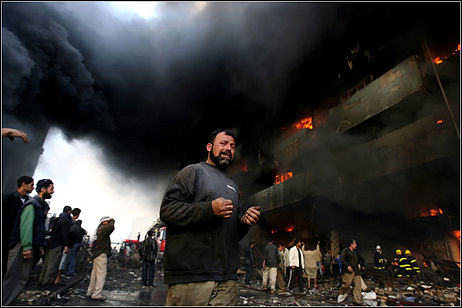
Which suggests…what, that a Green Berets-styled Iraq War film might succeed where others have failed? That if some director were to invent an optimistic fiction that had U.S. forces winning with someone like the Duke leading the charge, it might do some business? I wonder. I don’t think there’s a place for John Wayne in Iraq today any more than there’s a place for George S. Patton or Sgt. York or General Robert E. Lee. The only old-school guy who might fit into Iraq would be Steve McQueen‘s hard-assed loner character in Hell Is For Heroes.
There was no place for the Duke in Vietnam, really. Not in any straightforward heroic way. Oliver Stone, who was there, certainly didn’t think so. If anything, the Duke’s descendant in Platoon was the Tom Berenger character — the surly scarface who drank and looked down on the pot-smokers and wound up fragging Willem Dafoe‘s Jesus-like Sgt. Elias.
People seem determined to blow off any movie that has anything to do with Iraq. In my dreams I like to think that Average Joes might respond to (a) an old-fashioned 70mm Iraq War film — one that strictly prohibits cell-phone or handheld video footage, and goes instead for a 21st Century Apocalypse Now effect with Vittorio Storaro-level cinematography; and (b) one that delivers the excitement and intensity without the liberal finger-pointing about how we’re poisoning our souls over there. (Which is absolutely the case.) Something as good and jolting as the last third of Full Metal Jacket, say.
I only know that shitty-looking pixellated videos are over as far as Iraq War depictions are concerned. The cliche has been ground into the dust, and the only way to go now is to make that war look totally blue-chip, which is to say horribly and grotesquely “pretty.” Kathryn Bigelow and Paul Greengrass, take note!
I was thinking last night about all the rancor that goes on at this site. At least it’s proof that HE readers aren’t ones to nod off and say “tutto bene.” This led me for some reason to re-read Richard Brody‘s “Auteur Wars” in the 4.7 New Yorker this morning, and the following passage from a December 2007 Die Zeit interview (translated by GreenCine) with Jean Luc Godard:
“Arguing about cinema [is] something that’s stayed with me from the days of the nouvelle vague, even though it no longer exists in this form,” he says early on. “Because the beautiful thing about cinema is that it still always allows us to argue. Fundamentally. You can get far more upset about an opinion about a film than one about a painting or a piece of music.
“For example, when I say to someone, ‘It doesn’t surprise me at all that you like the new film by Robert Redford because I always knew you were daft.’ That sets things off immediately: ‘Who do you think you are! How dare you!’ And if I want to get to know someone, let’s say, for example, you, then I wouldn’t ask for your opinion about Iraq or Yugoslavia or the train strike, but instead ask you to name a film you like.”